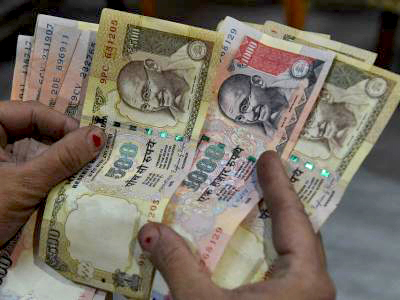Washington, Mar 29: The number of known coronavirus US cases soared well past 115,000, with more than 1,900 dead, as President Donald Trump said on Saturday he was considering imposing a quarantine on the hard hit New York region.
American healthcare workers in the trenches of the pandemic are appealing for more protective gear and equipment to treat a surge in patients that is already pushing hospitals to their limits in virus hot spots such as New York City, New Orleans and Detroit.
Trump told reporters he could order a quarantine on three states, New York, New Jersey and Connecticut, which between them have recorded at least 64,000 infections and 895 deaths.
He also appeared to soften his previous comments calling for the US economy to be swiftly reopened. Asked whether he thought the United States would restart by Easter Sunday, April 12, Trump replied, "We'll see, what happens."
New York Governor Andrew Cuomo said he had no details on any possible quarantine order for his state, telling a briefing: "I don't even know what that means. I don't know how that would be legally enforceable, and from a medical point of view I don't know what you would be accomplishing."
He said New York was postponing its presidential primary election to June 23, from April 28.
As the crisis deepened, nurses at Jacobi Medical Center in New York's borough of the Bronx protested outside the hospital on Saturday, saying supervisors asked them to reuse personal protective equipment, including masks. Some held signs with slogans including "Protect our lives so we can save yours."
"The masks are supposed to be one-time use," one nurse said, according to videos posted online. "Now, all of a sudden the CDC (Centers for Disease Control and Prevention) is saying that it's fine for us to reuse them. These choices are being made not based on science. They're being made based on need."
One resident at New York Presbyterian Hospital said they were issued with just one mask.
"This is your mask forever. You can bring it home with you. Here's how you can clean your mask," said the resident, who asked not to be named because he was not authorized to speak to the media. "It's not the people who are making these decisions that go into the patients' rooms."
Doctors are also especially concerned about a shortage of ventilators, machines that help patients breathe and are widely needed for those suffering from COVID-19, the pneumonia-like respiratory ailment caused by the highly contagious novel coronavirus.
Hospitals have also sounded the alarm about scarcities of drugs, oxygen tanks and trained staff.
By Saturday afternoon, the US number of cases stood at 115,842 with at least 1,929 deaths, according to a Reuters tally. The United States has had the most recorded cases of any country since its count of infections eclipsed those of China and Italy on Thursday.
BLACK MARKET
As shortages of key medical supplies abounded, desperate physicians and nurses were forced to take matters into their own hands.
New York-area doctors say they have had to recycle some protective gear, or even resort to bootleg suppliers.
Dr. Alexander Salerno of Salerno Medical Associates in northern New Jersey described going through a "broker" to pay $17,000 for masks and other protective equipment that should have cost about $2,500, and picking them up at an abandoned warehouse.
"You don't get any names. You get just phone numbers to text," Salerno said. "And so you agree to a term. You wire the money to a bank account. They give you a time and an address to come to."
Nurses at Mount Sinai Hospital in New York said they were locking away or hiding N95 respirator masks, surgical masks and other supplies that are prone to pilfering if left unattended.
"Masks disappear," nurse Diana Torres said. "We hide it all in drawers in front of the nurses' station."
One nurse at Westchester Medical Center, in the suburbs of the city, said colleagues have begun absconding with scarce supplies without asking, prompting better-stocked teams to lock masks, gloves and gowns in drawers and closets.
An emergency room doctor in Michigan, an emerging epicenter of the pandemic, said he was wearing one paper face mask for an entire shift due to a shortage and that hospitals in the Detroit area would soon run out of ventilators.
"We have hospital systems here in the Detroit area in Michigan who are getting to the end of their supply of ventilators and have to start telling families that they can't save their loved ones because they don't have enough equipment," the physician, Dr. Rob Davidson, said in a video posted on Twitter.
Sophia Thomas, a nurse practitioner at DePaul Community Health Center in New Orleans, where Mardi Gras celebrations late last month fueled an outbreak in Louisiana's largest city, said the numbers of coronavirus patients "have been staggering."
In the nation's second-largest city, Los Angeles Mayor Eric Garcetti said spiking cases were putting Southern California on track to match New York City's infection figures in the next week.
 In a letter, Russian Ambassador Alaxander Kadakin has raised the issue of diplomats not being able to withdraw enough money hampering the normal functioning of the mission and sought intervention of the External Affairs Ministry so that the withdrawal restrictions for diplomatic staff are lifted.
In a letter, Russian Ambassador Alaxander Kadakin has raised the issue of diplomats not being able to withdraw enough money hampering the normal functioning of the mission and sought intervention of the External Affairs Ministry so that the withdrawal restrictions for diplomatic staff are lifted.




Comments
Add new comment